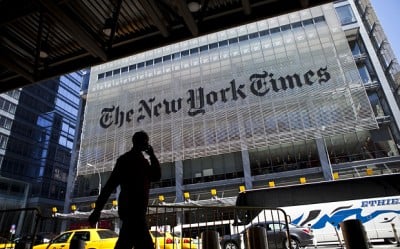The New York Times Endorses Hillary Clinton with a Banner Ad from Citigroup

Today’s digital edition of The New York Times captures the essence of the cancer eating away at our democracy: a leading newspaper is endorsing a deeply tarnished candidate for the highest office in America while a major Wall Street bank that has played a key role in her conflicted candidacy runs a banner ad as if to salute the endorsement. The slogan on Citigroup’s ad, “cash back once just isn’t enough,” perfectly epitomizes the frequency with which the Clintons have gone to the Citigroup well.
According to the Center for Responsive Politics, among the top five largest lifetime donors to Hillary’s campaigns, Citigroup tops the list, with three other Wall Street banks also making the cut: Goldman Sachs, JPMorgan Chase and Morgan Stanley. (The monies come from employees and/or family members or PACs of the firms, not the corporation itself.)

Hillary Clinton famously told ABC’s Diane Sawyer in 2014 that she and Bill Clinton left the White House after his second term “dead broke.” But apparently, Citigroup felt they were a good investment. According to PolitiFact, Citigroup provided a $1.995 million mortgage to allow the Clintons to buy their Washington, D.C. residence in 2000. That liability does not pop up on the Clinton disclosure documents until 2011, showing a 30-year mortgage at 5.375 percent ranging in face amount from $1 million to $5 million from CitiMortgage. The disclosure says the mortgage was taken out in 2001.
Citigroup has also committed $5.5 million to the Clinton Global Initiative, a charity run by the Clintons. It has also paid enormous speaking fees to Bill Clinton.
What has Citigroup gotten from its outsized support of the Clintons? Bill Clinton is the President who repealed the most important investor protection legislation of the past century, the Glass-Steagall Act, an outcome heavily lobbied for by Citigroup. Hillary Clinton has signaled to Wall Street that she will not push to have the Glass-Steagall Act restored while her leading opponent, Senator Bernie Sanders of Vermont, vows to restore it and return sanity to America’s financial system.
Just nine years after Bill Clinton signed this massive deregulation of Wall Street and gave Citigroup’s Sandy Weill a souvenir pen from the signing, the U.S. financial system collapsed in the greatest implosion since the Great Depression. Two years before the collapse, Sandy Weill had exited Wall Street as a billionaire as a result of this deregulation, while Citigroup became a penny stock in the crash and a ward of the government in the greatest taxpayer bailout in U.S. history.

